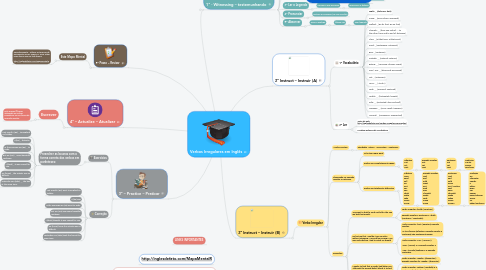
1. 1º - Witnessing – testemunhando
1.1. http://inglesdefato.com/verbos-irregulares-em-ingles/
1.2. 1º Ouvir
1.2.1. Tocar o Vídeo
1.2.1.1. Sem Legenda
1.2.1.1.1. Diversas Vezes
1.3. 2º Escrever
1.3.1. Palavras Entendida
1.3.1.1. Não se preocupar com:
1.3.1.1.1. Escrever Corretamente
1.3.1.1.2. Entender 100%
1.4. 3º Ler a Legenda
1.4.1. Corrigir o que escreveu
1.4.1.1. Reescrever o diálogo
1.5. 4º Pronunciar
1.5.1. Praticar a Pronúncia (Ler em voz alta)
1.6. 5º Absorver
1.6.1. Ouvir o Diálogo
1.6.1.1. Última Vez
1.6.1.1.1. Sem legenda
2. 5º Passo – Revisar
2.1. Este Mapa Mental
2.1.1. Periodicamente - Utilizar as técnicas da Ferramenta MAPA MENTAL. Para saber mais clique aqui no link abaixo: http://inglesdefato.com/MapaMentalR
3. 4º – Actualize – Atualizar
3.1. Escrever
3.1.1. Pelo menos 4 frases utilizando os verbos irregulares na sua forma de passado simples.
4. 3º – Practice – Praticar
4.1. Exercícios
4.1.1. Preencher as lacunas com a forma correta dos verbos em parênteses:
4.1.1.1. Last month I (go) _____________ to England on holiday.
4.1.1.2. It (be) _____________ fantastic.
4.1.1.3. In the evenings we (go) _____________ to pubs.
4.1.1.4. But we (see) _____________ some beautiful rainbows.
4.1.1.5. I (think) _______________ it was special for you.
4.1.1.6. He (know) ___________ the activity was so difficult.
4.1.1.7. Yesterday you (take) ____________ the bus at the same time.
4.2. Correção
4.2.1. Last month I (go) went to England on holiday.
4.2.2. It (be) was
4.2.3. In the evenings we (go) went to pubs.
4.2.4. But we (see) saw some beautiful rainbows.
4.2.5. I (think) thought it was special for you.
4.2.6. He (know) knew the activity was so difficult.
4.2.7. Yesterday you (take) took the bus at the same time.
5. LINKS INPORTANTES
6. http://inglesdefato.com/MapaMentalR
7. http://inglesdefato.com/verbos-irregulares-em-ingles/
8. http://inglesdefato.com/
9. 2º Instruct – Instruir (A)
9.1. 1º Vocabulário
9.1.1. Night: _______ (darkness, dark)
9.1.2. Came: _______ (move closer, approach,)
9.1.3. Walked: _______ (go by foot, go on foot)
9.1.4. Through: ______ (from one side of … to the other, from end to end of, between)
9.1.5. Then: _______ (at that time, at that point)
9.1.6. Food: _______ (sustenance, nutriment)
9.1.7. Bins: _______ (container)
9.1.8. Outside: ______ (external, exterior)
9.1.9. Eating: ______ (consume, devour, ingest)
9.1.10. Saw / see: ______ (discerned, perceived)
9.1.11. Vet: _____ (Veterinary)
9.1.12. Lorry: ______ ("truck")
9.1.13. Took: ______ (removed, captured)
9.1.14. Luckily: ______ (fortunately, happily)
9.1.15. Safe: ______ (protected, alive and well)
9.1.16. Happens: ______ (occur, result, transpire)
9.1.17. Unusual: _____ (uncommon, unexpected)
9.2. 2º Ler
9.2.1. Texto da aula http://inglesdefato.com/verbos-irregulares-em-ingles/
9.2.2. Localizar palavras do Vocabulário
10. 2º Instruct – Instruir (B)
10.1. Verbo Irregular
10.1.1. “Verbos Fortes”
10.1.1.1. atividades “Vitais”, “Concretas”, “Materiais”
10.1.2. Flexionado no Passado Simples o Particípio
10.1.2.1. NÃO tem regra geral
10.1.2.2. Podem ser completamente iguais
10.1.2.2.1. Infinitivo Cut Let Hurt
10.1.2.3. Podem ser totalmente diferentes
10.1.2.3.1. Infinitivo Have Feed Sell Go Get Say See Think Make Take Come Know
10.1.3. Exemplos:
10.1.3.1. You want to build a sand castle like the one we built last month.
10.1.3.1.1. Verbo irregular “build” (construir).
10.1.3.1.2. Passado simples e particípio é “built” (construiu / construído).
10.1.3.2. He bet me that I couldn’t run six miles without stopping. I proved him wrong; I ran nine miles before I had to catch my breath
10.1.3.2.1. Verbo irregular “bet” (apostou) passado simples. As três formas (infinitivo, passado simples e particípio) são exatamente iguais.
10.1.3.2.2. Verbo irregular “run” (“Correr”). “Ran” (correu) é o passado simples e “run” (corrido) também é o passado particípio.
10.1.3.3. I awoke to find that a spider had bitten me. Although the wound didn’t bleed, it itched terribly.
10.1.3.3.1. Verbo irregular “awoke” (despertou) - passado simples de “awake” (despertar).
10.1.3.3.2. Verbo irregular “Bitten” (mordida) é o particípio de “bite” (morder).
10.1.3.3.3. Verbo irregular “Bleed” (sangrar) está na sua forma infinitiva.
10.1.3.4. Let’s drink some of this lemonade. I drank some yesterday and found it delicious.
10.1.3.4.1. Verbo irregular “drink” (beber) está no infinitivo. “Drank” é o passado simples (bebeu)
10.1.3.4.2. “Found” (achei – achou) é o passado simples de “Find” (achar / encontrar).

